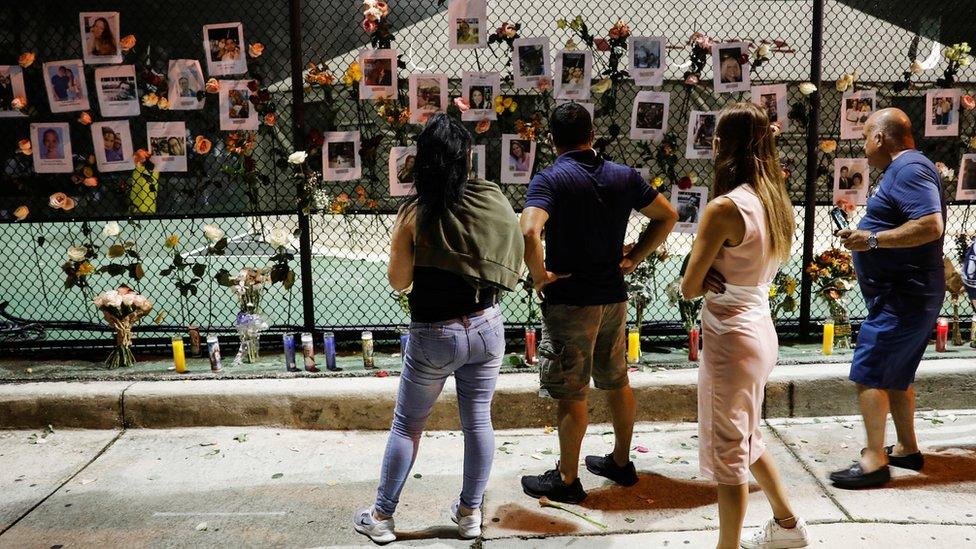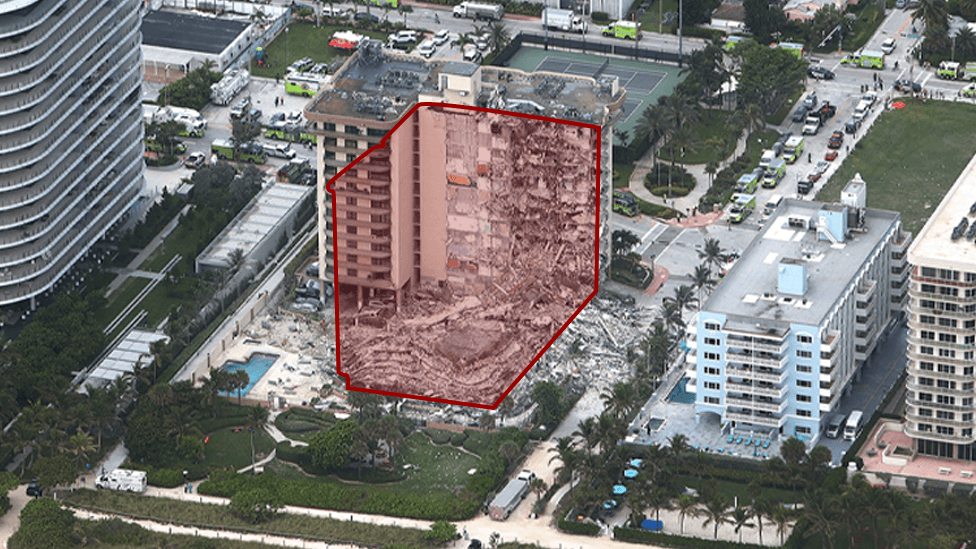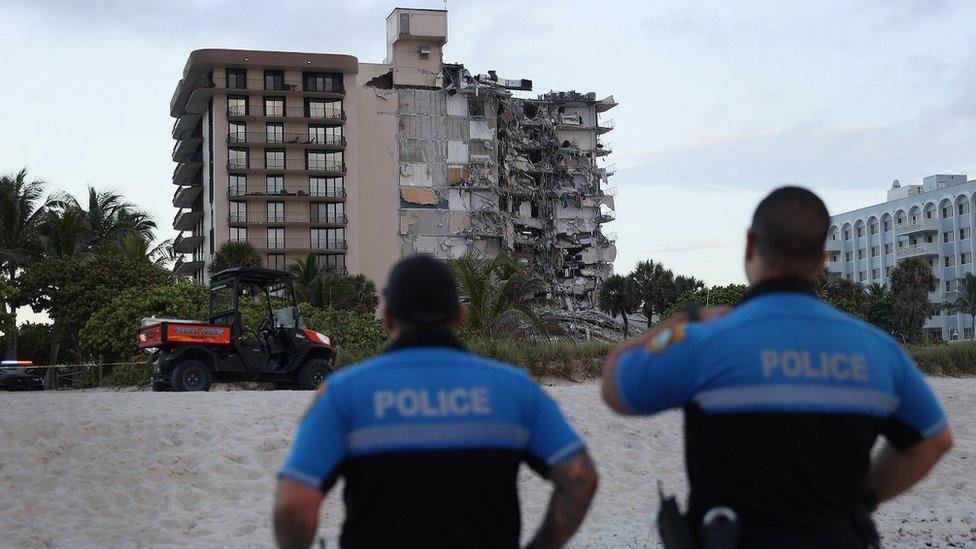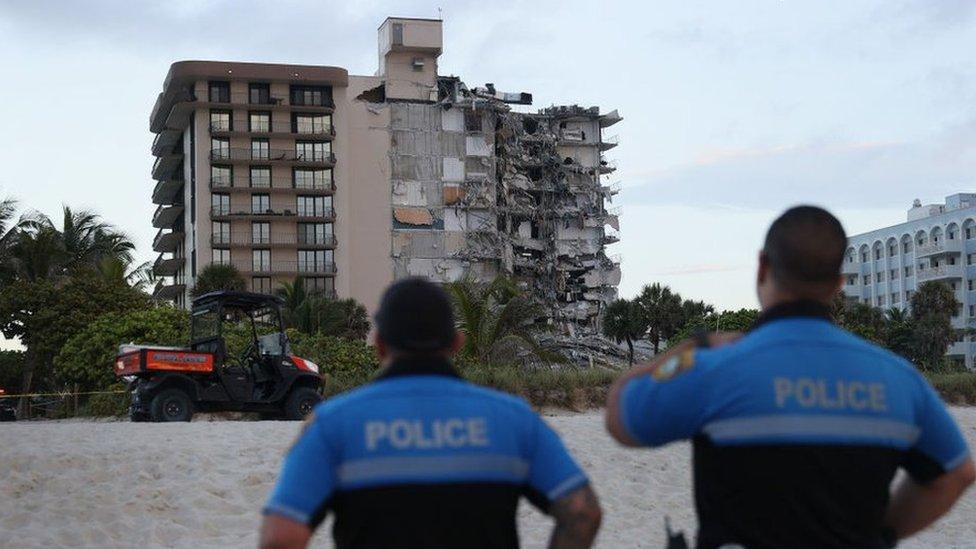Florida building collapse: Report from 2018 warned of 'major damage'
- Published
Firefighters search for survivors under collapsed Miami building
An inspection in 2018 highlighted "a major error" in the original design of an apartment block that collapsed near Miami, Florida, it has been revealed.
The engineer's report, which has just been made public, said the fault prevented water draining from the base of the seafront Champlain Towers.
Part of the building collapsed on Thursday while many residents slept.
Hopes are fading for the 159 people still unaccounted for. So far, five deaths have been confirmed.
Rescue efforts were hampered on Saturday after a fire broke out underneath the rubble.
Miami-Dade Mayor Daniella Levine Cava said the blaze was "very deep" and rescuers faced "incredible difficulties" because of the fire.
The building consultant's report, external from three years ago came to light in a series of documents made public by the town of Surfside.
The engineer, Frank Morabito, said the lack of proper drainage was "a systemic issue" that stemmed from a flaw "in the development of the original contract documents".
He flagged what he called "major structural damage" to the concrete platform beneath the swimming pool deck.
"The failed waterproofing is causing major structural damage to the concrete structural slab below these areas," he wrote. "Failure to replace the waterproofing in the near future will cause the extent of the concrete deterioration to expand exponentially."
The engineer also referred to "abundant cracking… of columns, beams and walls" in the parking garage.
His report didn't suggest the 40-year-old building was at any imminent risk of collapse but he urged that the concrete repairs be carried out in "a timely fashion".
Correspondents say it is not yet clear if the repairs were carried out or if the problems highlighted contributed to the structural failure. Champlain Towers had been due to undergo a multi-million dollar refurbishment this year.
The governor of Florida, Ron DeSantis, has promised that authorities will find out what happened saying "anybody affected by this directly wants that answer".
What is the latest with the search efforts?
Search and rescue teams continued to look for signs of life on Saturday, while families anxiously waited for updates.
Rachel Spiegal, whose missing mother lived on the sixth floor of the building, told the Associated Press she was "praying for a miracle".
Jeanne Ugarte said she did not expect her long-time friends who lived in the building to be found alive. "It's been too long," she told the news agency.

People are waiting for news about missing loved ones
Teams have been using machines, drones and specially trained dogs in their efforts to find survivors.
"Any time that we hear a sound, we concentrate in that area," Miami-Dade Assistant Fire Chief Raide Jadallah told reporters. "It could be just steel twisting, it could be debris raining down, but not specifically sounds of tapping or sounds of a human voice."
Rescuers are working in rotation with a limited number allowed on site at any one time to prevent any further collapse.
Teams from Mexico and Israel have been helping with the search efforts, according to reports.
President Joe Biden approved an emergency declaration for Florida, meaning the Federal Emergency Management Agency will help state agencies with the relief effort.
Surfside Mayor Charles Burkett said crews were doing everything possible to find survivors. "We do not have a resource problem, we have a luck problem," he said.
Local officials have provided families with hotel rooms and food as they wait for news about their loved ones.
The missing include people from Israel and Latin America, according to reports. Paraguay's foreign ministry said six of its nationals had been registered as missing, including relatives of the country's first lady.
What happened to the building?
The building contained 136 apartments and 55 of them collapsed early on Thursday, leaving piles of debris.
Resident Barry Cohen was in bed in a section of the building that survived when the collapse happened. "It sounded like thunder, and my wife and I, we went out on the balcony; it looked like a bomb had exploded," he told the BBC.
"When we opened the door, there was no building there, it was just a pile of rubble," he said.
Eyewitnesses described hearing what sounded like thunder before seeing a huge cloud of dust in the aftermath of the collapse.


A full investigation into the collapse is set to begin after the rescue mission.
As the building has stood since 1980, it was due its standard 40-year review. It was undergoing its "recertification" process and required repairs, officials said.
Kenneth Direktor, a lawyer involved in the work, was quoted in the New York Times as saying engineers had identified rusted steel and damaged concrete that needed repairing, but added that he saw nothing to suggest the collapse had anything to do with that review.
A study from researchers at Florida International University published last year found that the building had been sinking at a rate of two millimetres per year in the 1990s, which may have affected the building structurally.
But the author has cautioned that the study was just a snapshot in time. The building was constructed on reclaimed wetland, which experts say is always of concern as the land underneath can compact over time, leading to shifts.
On the sinking, the author of the study, Prof Shimon Wdowinski, told the Miami Herald newspaper: "We've seen much higher than that, but it stood out because most of the area was stable and showed no subsidence."
Prof Wdowinski said the research was not meant to suggest certainty about the latest incident.
Related topics
- Published28 June 2021

- Published24 June 2021

- Published25 June 2021
